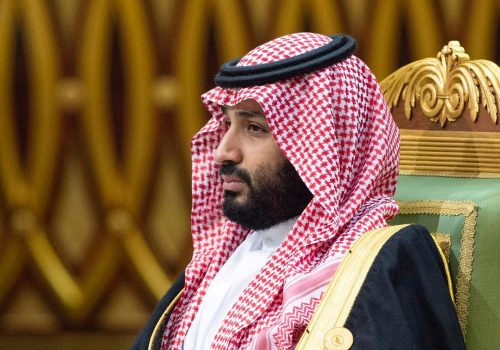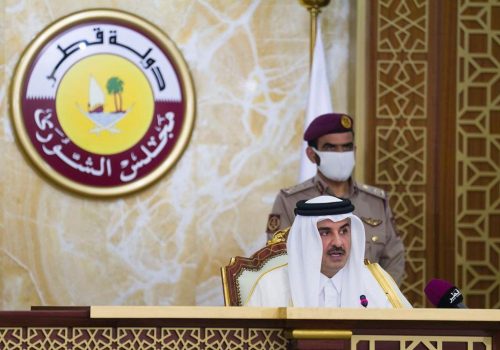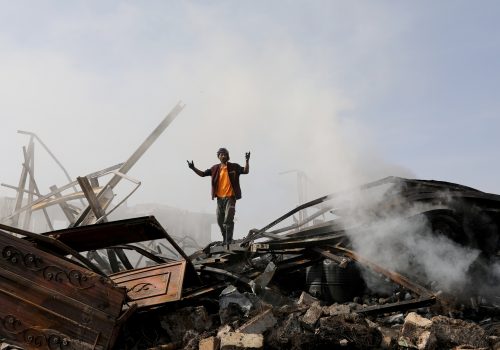Experts react: The United States designates Houthi rebels as a Foreign Terrorist Organization
On January 11, US Secretary of State Mike Pompeo announced that the United States will designate Yemen’s Houthi rebel group Ansar Allah as a Foreign Terrorist Organization (FTO). The designation will also include labeling three Ansar Allah leaders—Abdullah Yahya al-Hakim, Abdul Malik al-Houthi, and Abd al-Khaliq Badr al-Din al-Houthi—as Specially Designated Global Terrorists (SDGTs).
The move is intends to hold Ansar Allah “accountable for its terrorist acts, including cross-border attacks threatening civilian populations, infrastructure, and commercial shipping.” The State Department is following through with the designation despite warnings from United Nations (UN) officials and aid organizations that the blacklisting will further contribute to the world’s worst humanitarian crisis in Yemen, noting that it intends to put measures in place to minimize the impact of the move on imports and humanitarian aid headed to the country.
Below, Atlantic Council experts react to the designation and what it means for the wider region.
Jump to an expert reaction:
Kirsten Fontenrose: Ansar Allah must be held accountable by the international community
Tom Warrick: A reminder to overhaul pre-9/11 laws
Barbara Slavin: The Houthi designation is about spite, not strategy
Nabeel Khoury: A move that ties Joe Biden’s hands
Carmiel Arbit: The designation is controversial because of the messenger
Marc Sievers: The US action does more harm than good
Mohsen Tavakol: Why the blacklisting is not a big concern for Iran
Ansar Allah must be held accountable by the international community
“Career State Department experts and a full-time UN negotiator have worked tirelessly throughout the Trump years to bring the Houthis to the political table with realistic expectations. This has not been successful. While the Houthis believe the incoming US administration supports Houthi backers and opposes their adversaries, their continued intransigence is to be expected.”
“The Trump administration considered this designation earlier. In 2018, the administration made the decision not to designate based on advice from the UN resident coordinator in Yemen who warned that designation would make it impossible for aid organizations to feed people. At the same time, the UN special envoy for Yemen argued impactfully that designation would prevent the Houthis from engaging in the political negotiations that were expected to lead to a political solution to the war. The Houthis have exploited these arguments for three years and were made aware in mid-2020 that designation was pending, absent a unified Houthi position and movement on a political resolution. They called the United States’ bluff.”
“The Houthis should be held accountable for the impact their intransigence has had on the humanitarian situation in Yemen. The United States and Saudi Arabia have made sustained and sincere attempts to work with the UN to create conditions for political progress. Ansar Allah’s refusal to advance a settlement has been enabled by the fact that they have the international humanitarian-aid community in a stranglehold.”
“The usefulness of this designation will be defined by whether it can catalyze a swift end to the self-sabotage exhibited by the Houthis. Right now, when one faction begins quiet talks with the Saudi-led coalition to end the war, another faction launches rockets into Saudi Arabia. This designation announcement is inevitably igniting serious internal negotiations about their way forward as an organization. It is not possible for Ansar Allah to appease the population they are oppressing without the help of the international community. If this realization leads to Houthi consensus about a revised political platform, then the designation of the group should be lifted immediately. If the international community once again treats Ansar Allah like a victim instead of a responsible actor, then the Houthis will get the message that they can continue for four more years to manipulate humanitarian aid as a method for controlling a population that does not support them.”
Kirsten Fontenrose, director of the Scowcroft Middle East Security Initiative.
A reminder to overhaul pre-9/11 laws
“Pompeo’s designation of the Houthis as a FTO under Section 219 of the Immigration and Nationality Act is another reminder of the need to overhaul the pre-9/11 laws under which such designations are made. Congress’s original intent was to treat governments that sponsored terrorism under one set of laws and non-governmental terrorist groups under another set of laws. Sanctions, punishments, and limitations are different. The Trump administration’s designation of the Iranian Islamic Revolutionary Guards Corps as a FTO was the first instance of a state entity being designated under laws intended to apply to non-state actors. Today’s designation fits the more normal pattern because the United States recognizes President Abdrabbuh Mansour Hadi’s government based in Aden as Yemen’s legitimate government, not the Houthis, even though the Houthis control most of northern Yemen and are in armed conflict against Saudi Arabia and the United Arab Emirates (UAE).”
One reason the Trump administration designated the Houthis was the cascading series of consequences that apply to FTOs and those who provide them with even minor levels of material support. The State Department said it would mitigate the unintended consequences of the Immigration and Nationality Act. Legal practitioners will have to be careful until these measures are fully understood.”
“These pre-9/11 laws need to be overhauled in light of post-9/11 changes like the formation of the US Department of Homeland Security (DHS), whose secretary has no statutory role in the secretary of state’s determination of which groups get designated as FTOs. Nor does the National Counterterrorism Center (NCTC) have a formal role. (The NCTC and DHS, the only cabinet department formally chartered to protect the United States from terrorist attack, are usually consulted through the interagency process, but the secretary of state can ignore their views.) The consequences of designation also need to be reviewed and updated. Rules for cascading consequences should be the result of deliberate policy decisions, not laws that operate like the out-of-control brooms of The Sorcerer’s Apprentice.”
Tom Warrick, nonresident senior fellow with the Atlantic Council’s Middle East programs.
The Houthi designation is about spite, not strategy
“Like so many of this administration’s actions, the designation of the Houthis reeks of spite—not strategy. Angered that US support for the Saudis has not led to a Houthi defeat, Pompeo has taken an action that is likely to prolong the terrible war in Yemen at the cost of many more lives. Despite claims that the United States can still facilitate humanitarian aid, the designation will make it even harder to get food and medicine to ordinary Yemenis. This is also a further abuse of the State Department’s power to designate countries, organizations, and individuals as ‘terrorist(s).’ Always in part political, the designation process has now deteriorated to the point of farce since the targets are invariably chosen because of their hostility to the United States—or closeness to US adversaries such as Iran—rather than because of their purported ‘terrorist’ acts.”
Barbara Slavin, director of the Future of Iran Initiative at the Atlantic Council.
A move that ties Joe Biden’s hands
“The eleventh-hour designation by the outgoing Trump administration is reckless and ties the hands of the incoming Biden administration.”
“Morally, the Houthis are not angels, but nor is any other player in the Yemen war. The Arab coalition has been reprimanded several times by Congress and by the UN for the bombardment of civilian areas in Yemen. The militias sponsored by the UAE, in particular, have been investigated and reprimanded for their human-rights violations.”
“Politically, the designation makes no sense—if the goal of US diplomacy is peace in Yemen and the region. The Biden administration has every intention of using US diplomacy to try to end the war. The decision will tie the incoming administration’s hands as it will have to try to reverse the decision, which is not an easy thing to do, or to justify to Congress why it wants to deal with the Houthis despite the designation.”
“Additionally, the decision feeds into the hands of the hardliners within the Houthi organization and makes it difficult for their leadership to engage in peace talks. It is also possible that the decision might encourage the Hadi government and the Arab coalition to try to press this war, already in its sixth year, to the bitter end, further devastating the people of Yemen.”
Nabeel Khoury, nonresident senior fellow with the Atlantic Council’s Middle East programs.
The designation is controversial because of the messenger
“The decision by President Donald Trump to designate the Iran-backed Houthis as a terrorist organization will no doubt generate significant controversy, not least because of the messenger. The designation further tightens the screws on Iran and its proxies in anticipation of handing the reins to a more diplomatically inclined Biden administration. The violent group had already been placed under UN sanctions in response to its systematic abuse of minorities and pattern of targeting civilians. At a time when Yemeni civilians are in dire need of humanitarian assistance, this will complicate the delivery of that aid. The next administration will need to work closely with the international community to take substantive steps to help protect Yemen’s beleaguered citizens.”
Carmiel Arbit, nonresident senior fellow with the Atlantic Council’s Middle East programs.
The US action does more harm than good
“Based on the Houthis’ actions and stated intentions, there are good reasons to support a designation. But because under US law any engagement with the Houthis is considered to be providing material support, designating them as a terrorist organization is likely to complicate the UN’s ongoing efforts to promote a negotiated end to Yemen’s horrific war. Humanitarian efforts to provide food and medicine to Yemeni civilians will likely be delayed or blocked even if the United States specifically exempts humanitarian organizations. For the past five years, Oman has successfully arranged the release and repatriation of numerous foreign nationals, most of them Americans, held by the Houthis. This required intensive direct negotiations between the Omanis and the Houthis; negotiations that, following designation, would likely be considered material support and therefore subject to sanctions. On balance, this designation is likely to cause more harm than good.”
Marc Sievers, nonresident senior fellow with the Atlantic Council’s Middle East programs.
Why the blacklisting is not a big concern for Iran
“Blacklisting the Houthis will most likely be a secondary concern for Tehran, as it won’t have any impact on the Iranian government’s biggest dilemmas. Nonetheless, the designation may further upset the Houthis, resulting in increased armed actions against US allies and their interests in Yemen and elsewhere. On the other hand—perhaps this is wishful thinking—the blacklisting may force the Houthis to evolve into an organized and effective political, administrative, and governing party, thereby pushing them to prepare for future peace talks. This could then lead to political changes in Yemen, rather than the Houthis remaining mainly as a fighting militia. The timing of the blacklisting is quite odd, which—as expressed by many—could be an attempt to further complicate and impede the incoming US administration’s Middle East policy.”
Mohsen Tavakol, nonresident senior fellow with the Atlantic Council’s Middle East programs.
Sign up for all the latest updates!
Sign up for the MENASource newsletter, highlighting pieces that follow democratic transitions and economic changes throughout the region.

Through our Rafik Hariri Center for the Middle East and Scowcroft Middle East Security Initiative, the Atlantic Council works with allies and partners in Europe and the wider Middle East to protect US interests, build peace and security, and unlock the human potential of the region.
Image: Armed members of the Houthi movement visit the grave of Houthi senior official Saleh al-Sammad at al-Sabeen Square in Sanaa, Yemen January 11, 2021. REUTERS/Khaled Abdullah


